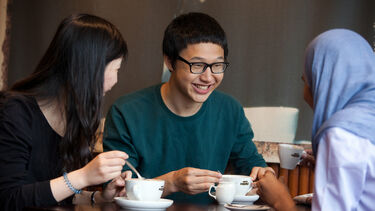Choosing to do the research masters was one of the best decisions that I made

About the job
What are your main responsibilities?
Drafting patents, responding to patent examinations, getting patents granted in different countries.
Can you describe a typical day?
Lots of reading of patents for similar inventions, and figuring out how our invention differs from them, then constructing arguments to show this. If I am drafting, this involves attempting to claim for an invention in such a way as to gain the maximum possible scope of protection, whilst not infringing on other current patents.
What is the most rewarding aspect of your current role or your greatest career achievement so far?
The job is very intellectually involving, as it requires you to be able to analyse patents in great detail and identify how they differ from yours, which is often very nuanced and easy to miss.
Then you have to put together arguments to convince the patent examiner of this difference. So, a rewarding aspect of the job is when you find the nugget of information on which your argument can be built, and it all falls into place.
Are there any challenging aspects? If so, what are they?
Sometimes, finding this key piece of information takes a long time and multiple readings of many documents. But this is something that gets easier with time and practice (or so I am told).
What skills/qualifications from your degree or other training do you make use of in your job?
Some of the most important skills for my job that I learned on my degree were the ability to communicate, both verbally and in writing. In my job, it is vital to be clear and concise when communicating, and I honed this skill by having to present the results of various projects throughout my degree, both in reports and presentations.
In addition, my degree taught me the skill of being able to read through a technical document and identify the important information quickly, whilst ignoring superfluous information.
How have these skills or your course made a difference in your career?
Being able to communicate clearly, particularly in written form, is a skill that I use every day in my job. Therefore, being well-practiced in writing technical documents makes my job significantly easier. Also, being able to process large quantities of information quickly speeds up my job no end.
Choosing to do the research masters was one of the best decisions that I made throughout my education. Having spent much of the first and second years gaining knowledge in the field of materials science, it allowed me to develop my skills of critical thinking, analysis, and communication.
The mini-projects were an excellent vehicle for learning these skills across a wide variety of disciplines, and the final year project was a fantastic opportunity to put them all into action.
The teaching on this course was fantastic, I felt supported throughout and as though my input was always valued. With every task that was set, there was a specific goal that was both challenging yet achievable.
Chris Rodger
Technical Assistant, Patent Boutique LLP
University experience
Why did you choose to study at 91Ě˝»¨ rather than another institution?
The city is beautiful, the people are friendly, the department is one of the best in the country and had the most welcoming atmosphere by far out of those that I visited.
Did your time at 91Ě˝»¨ meet your expectations?
Absolutely, it exceeded my expectations. I had a wonderful four years in 91Ě˝»¨, and I felt extremely well equipped to get a job when the time came.
What were the best things about studying in the department?
The friendly and welcoming atmosphere, which comes from both the academics and the students. It also has some of the best facilities and world-leading research groups. It is a place that encourages growth and gives students every opportunity to do so.
Career information
What have you done since leaving the University?
I graduated in the summer, after which I decided that I wanted to try a career in the patent world. So I applied for a number of different firms, managed to get several interviews, and was offered a job at Patent Boutique LLP.
Where do you see yourself in the future?
My current plan is to complete my training and become a qualified patent attorney, which is a process that usually takes around five years.
Advice to students
If you could give one piece of advice to current students or recent graduates, what would it be?
I took a risk when choosing to go on the research stream of the masters course, as it was the first year of it running. This was nerve-wracking at first, but at every stage, I felt fully supported by the academics and they worked extremely hard to make it work. So my advice would be to take a risk, and trust that the department has your best interests at heart.

International undergraduate scholarships
We offer a generous package of financial support for international undergraduate students, including scholarships worth ÂŁ10,000 towards the annual tuition fee.
Applications are open for existing offer holders for an undergraduate degree programme starting in autumn 2025.
